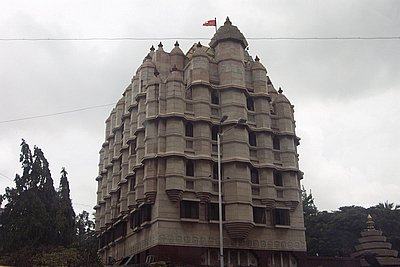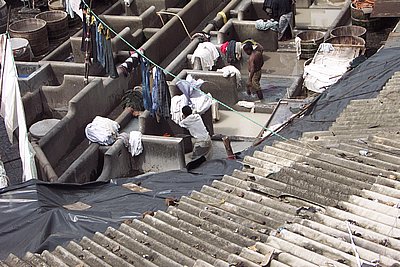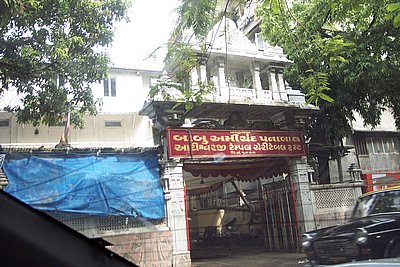Sunday, June 26
A tour of Mumbai
As I mentioned on the entry for June 25,
written on June 26, it's been raining a little bit here in
Mumbai. While I was writing that entry Sunday morning, I looked
out at the noise outside my window and found that the Manhattan-sized
island had disappeared. Here's a before and after shot showing
the effect of Monsoon rain.


But it only rained for about 1/2 hour.
Today Alex took a tour of Mumbai, organized by our local travel agency contact. Rachel didn't want to leave the comfort of home, so it was up to your intrepid writer to hook you up with the real deal of Mumbai. Here you go- you asked for it!
First, let's stop at a Hindu temple dedicated to the elephant-headed god Ganesha.

Next let's stop at the local laundry. Apparently 10,000 people work here on peak days, this being a Sunday is an off-day. Certain essential services are pretty well organized here, with whole groups collecting, delivering, distributing, cleaning, drying and returning both dirty laundry, in this case, and lunches. It's so large scale and vast that you'd almost think it's a communist thing - but it's actually capitalism in action. The guy in the foreground of the second picture is standing in a pool of water that he soaks the fabric in, scrubs it against the flat rock you see in each cube, and then bashes it on the side to remove the water. He's working hard for his rupee.


Next it was a stop at the Mahatma Gandhi home and museum, the "Mani Bhavan Gandhi Sangrahalaya", web site is here, a very interesting site for anyone interested in the Indian struggle for an independent country. This is where he lived for many years when he was in Bombay. The room you see is the one he lived in, spinning wool into thread to make homespun clothing, as he told his countrymen to do to help break the yoke the British had put upon them. It was actually a pretty good museum, with dioramas of various important stages of his life, lots of photos and letters to and from him, including some to FDR, Hitler, and from Albert Einstein. I bought his autobiography and a book of his stories and quotes for 200 rupees, less than $5. They're also accumulating every book that mentions him in a library for future generations to have to do research. Worth the stop.


Next my guide took me to a Jain temple. Jain is an offshoot of Hinduism, that broke off some 2500 years ago. They don't believe in a god, rather they believe in the transmigration of souls, that if you do positive things in your life you will return as a higher or more pleasant form of life, if you do bad things you come back in a lower form of life. Hinduism believes this as well, the main difference as explained to me was that while Hindus believe it is your actions that affect your Karma - helping people, not harming others, etc, Jainists believe that if you do something wrong, donating money will eliminate the act. In effect, you can make financial payments to improve your Karma. She also said that most of the Jain people are bankers, moneylenders, gold and silver dealers, or movie producers. Interesting. Had to take my shoes off here as well.


But it only rained for about 1/2 hour.
Today Alex took a tour of Mumbai, organized by our local travel agency contact. Rachel didn't want to leave the comfort of home, so it was up to your intrepid writer to hook you up with the real deal of Mumbai. Here you go- you asked for it!
First, let's stop at a Hindu temple dedicated to the elephant-headed god Ganesha.
Next let's stop at the local laundry. Apparently 10,000 people work here on peak days, this being a Sunday is an off-day. Certain essential services are pretty well organized here, with whole groups collecting, delivering, distributing, cleaning, drying and returning both dirty laundry, in this case, and lunches. It's so large scale and vast that you'd almost think it's a communist thing - but it's actually capitalism in action. The guy in the foreground of the second picture is standing in a pool of water that he soaks the fabric in, scrubs it against the flat rock you see in each cube, and then bashes it on the side to remove the water. He's working hard for his rupee.
Next it was a stop at the Mahatma Gandhi home and museum, the "Mani Bhavan Gandhi Sangrahalaya", web site is here, a very interesting site for anyone interested in the Indian struggle for an independent country. This is where he lived for many years when he was in Bombay. The room you see is the one he lived in, spinning wool into thread to make homespun clothing, as he told his countrymen to do to help break the yoke the British had put upon them. It was actually a pretty good museum, with dioramas of various important stages of his life, lots of photos and letters to and from him, including some to FDR, Hitler, and from Albert Einstein. I bought his autobiography and a book of his stories and quotes for 200 rupees, less than $5. They're also accumulating every book that mentions him in a library for future generations to have to do research. Worth the stop.
Next my guide took me to a Jain temple. Jain is an offshoot of Hinduism, that broke off some 2500 years ago. They don't believe in a god, rather they believe in the transmigration of souls, that if you do positive things in your life you will return as a higher or more pleasant form of life, if you do bad things you come back in a lower form of life. Hinduism believes this as well, the main difference as explained to me was that while Hindus believe it is your actions that affect your Karma - helping people, not harming others, etc, Jainists believe that if you do something wrong, donating money will eliminate the act. In effect, you can make financial payments to improve your Karma. She also said that most of the Jain people are bankers, moneylenders, gold and silver dealers, or movie producers. Interesting. Had to take my shoes off here as well.
Next it was a stop at the Hanging Gardens. First, check out this picture I took from the hotel, some 20 miles away:
This pipeline carries water from the outskirts of Mumbai into the city center, where its first stop is this hanging garden park. It "hangs" as large platforms above a water chlorine treatment plant - it's not the plants that hang. It's actually a nice park, about 300 feet on a side, and there's another section across the road where you can see the Arabian Sea. In the second picture below, if you look hard you'll see some vultures flying around in the distance. This is over a site called the "Towers of Silence", which is a closed-off location where the Parsi dispose of their dead. I say it that way because the Parsi, who were immigrants to the area hundreds of years ago from latter-day Iran, worship the four primitive elements - earth, fire, water and air. As fire worshippers they won't cremate a body, nor do they want to desecrate the earth or water by burying or dumping the body. So what's left? After the services are over, the body is taken to a tower with an elevator in it, raised up, and left for the vultures to eat. She said it takes about 40 minutes, and there must have been a body there today for there to be vultures. Fortunately for us, it is only open to Parsis.
Next it's across the street to the kid's park, including a very large shoe for them to play in - apparently they know the story of the "old woman who lived in the shoe". There is also an excellent viewing point for pictures of the rest of Bombay.
Mumbai / Bombay is actually on seven islands that are linked together by bridges. Also, I learned that Bombay was not a name given to the city by the English - rather it is Portuguese for "beautiful like a young girl's face", named so by Portuguese explorers in around 1498, when the place must have been a garden spot. Just like today. Yeah.
This next impressive building is - what? A train station? Yes, it's Victoria Terminus, a very large train station designed in middle-Victorian style as a way of impressing visitors and locals with the power the British had. My guide tells me that while the Indians were happy to be rid of the "Britishers", they are very happy to have received some of their boons, including a reasonably solid legal system, many roads and train facilities, good principles of engineering and irrigation, and a financial system that is functional. Without these, she said, India would still be a horribly backward country with no redeeming values. By the way, Victoria Terminus has now been renamed the easier-to-pronounce Chhatrapati Shivaji Terminus. Yes, that's spelled correctly.
Next is Flora Fountain, carved of Portland (England) stone and shipped from England. While the fountain runs a few hours a day, it's apparently overshadowed by the Martyr's Memorial on another side of the block.
Next it's to the most well-known landmark, the "Gateway to India". Erected in 1924 to commemorate King George VI and Queen Mary arriving in India. When they actually did arrive in 1911, a pasteboard mockup was used instead of the present-day stone. An impressive building, it has reception galleries for banquets. It's also surrounded by a few thousand people who are just hanging out or trying to sell you weird tourist trinkets, and performing monkeys. In addition it's right by the water, it is after all a welcoming landmark from a period when all travel is by sea. Therefore I did get splashed by the high-tide waves from the Arabian Sea, and I made sure to wash my hands afterwards because as blue as the water is in the Bay of Bengal, the Arabian Sea is brown and murky.
Being on the Arabian Sea there naturally is going to be oil tankers - so here are a few.
The last thing on today's tour, really on the way home, since the guide had asked to be let out about 15 minutes prior to this and the driver was just driving me home, was this view of the Haji Ali Mosque, which was built on its own little island out in the sea and is connected by a causeway. We couldn't visit it for 3 good reasons: 1) I am not Muslim, 2) the causeway is usually lined with beggars and I was advised not to go through there, 3) it's closed because at high tide the water flies 20 feet in the air against the causeway and makes it unpassable. Now, maybe I'm overthinking this, but if your religion requires you to worship at 5 regularly-spaced times of the day, why would you put a mosque out on an island where at least twice a day the access road becomes unpassable? As I said, maybe I'm overthinking this...
That's it for today everyone. Tomorrow we have our final company review and then a day before we come home. Hope to see you all soon!